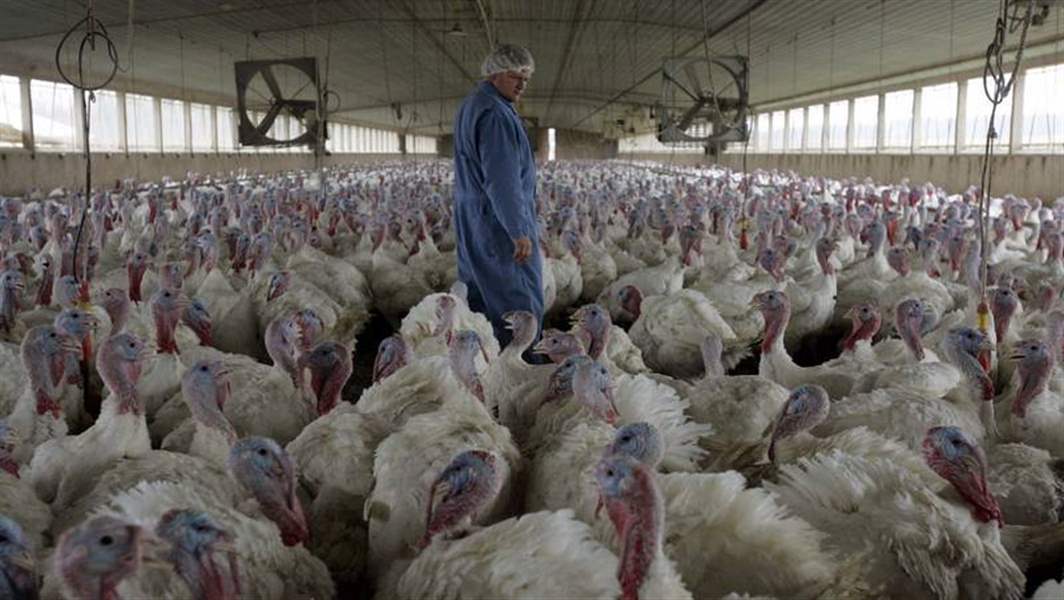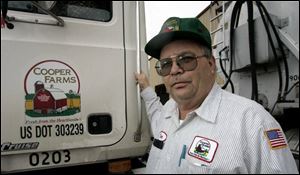
Parts supplier grew quietly
11/20/2005
Bill Staugler, Cooper Farms production manager, surveys the occupants of a 6,000-turkey barn near Fort Recovery, Ohio. At full size, the birds will weigh 34 to 47 pounds.

Bill Staugler, Cooper Farms production manager, surveys the occupants of a 6,000-turkey barn near Fort Recovery, Ohio. At full size, the birds will weigh 34 to 47 pounds.
OAKWOOD, Ohio - Cashing in on turkey-consumption trends unrelated to Norman Rockwell-inspired Thanksgiving scenes, Gary Cooper and his siblings have quietly raised one of the nation's largest turkey-producing empires here.
Some of the juicy turkey breasts made by Cooper Farms Inc. will no doubt end up as the main course as families gather in kitchens and dining rooms this week.
But a press release distributed to news outlets trolling for a Thanksgiving angle this month tells the larger story: "If you were to try to fit a Cooper Farms turkey into your home oven, you'd probably need a bigger oven."
The macro-birds - weighing an average of 40 pounds - raised by Cooper Farms do not leave company processing facilities intact.
Smoked, sliced meats will go to delis at Kroger and elsewhere; ready-to-cook breasts, some with apple and cranberry stuffing, are headed for supermarket refrigerator cases; thigh meat will go to markets in Mexico; and other products are destined for restaurant chains like Bob Evans.
But families seeking whole turkeys for their holiday meals will have to look elsewhere because Cooper Farms doesn't sell its birds that way.
"Whole turkey is really only marketed for the holidays," explained Mr. Cooper, chief operating officer of the company begun by his father, Virgil, during the Great Depression near this tiny Paulding County village 68 miles southwest of Toledo.
"In the past, the holidays were all there was for turkey. But now, people are consuming turkey in many different forms throughout the year," Mr. Cooper said.

Tom Staugler, feed mill manager, says the mill will reach full capacity next year.
Turkey consumption has more than doubled since 1970, but not because of the holidays. Just 30 percent of turkey is eaten at Thanksgiving and Christmas, compared with 50 percent in 1970, said Sherrie Rosenblatt, spokesman for the National Turkey Federation in Washington.
And, like Cooper Farms, producers have adjusted.
"We are time-starved consumers looking to get dinner on the table quickly," explained Ms. Rosenblatt. "Thanksgiving is a time of tradition. It's a time when people get into the kitchen and actually cook.
"The rest of the year, we are not doing that. So, the industry took the bird apart."
But in taking "the bird apart," Cooper Farms has assembled Ohio's largest turkey operation and one of the state's biggest agricultural enterprises overall.
Cooper Farms is the nation's 12th-largest turkey producer behind powerhouses such as Jennie-0 and Butterball, according to the industry publication Watt PoultryUSA. It annually produces 170 million pounds of meat from 4.5 million turkeys.
Sales top $170 million a year.
Almost single-handedly, Cooper Farms has made Ohio the nation's 11th-largest turkey-producing state. Of the 5.7 million turkeys raised here annually, the firm produces 80 percent, according to figures provided by the company and the U.S. Department of Agriculture. By weight, which many consider a more important measure, Cooper produces 90 percent of turkey meat in Ohio, Mr. Cooper said.
The firm employs nearly 1,200 people at a hatchery here, plants in Van Wert and St. Henry, and grain-production operations in Fort Recovery.
That doesn't include 400 farmers in Ohio and Indiana who produce turkeys, pigs, chickens, and eggs under contract to the company. Cooper Farms officials oversee animal production but raise none directly.
The firm is among the regions's top purchasers of corn and soybeans, crushing the crops into a half-million tons of animal feed annually.
Cooper Farms is one of the nation's leading suppliers of turkey chicks, each year hatching 15 million, or 5 percent of the total nationally.
It also is a major supplier of chicken eggs, primarily for institutional use.
The firm supplies up to half of the private-label turkey sold in Kroger delis nationwide. Other retail customers include Wal-Mart and the Costco warehouse chain. Restaurant customers include Schlotzsky's Deli and Bob Evans.
The Cooper siblings trace the company's birth to 1938, when their father took over a small enterprise begun here by his mother for "egg money" shortly after the turn of the 19th century. By the 1940s, Virgil Cooper was able to quit his factory job to devote full time to his hatchery.
"It's been amazing to watch," Bill Staugler, turkey production manager, said of company expansion in recent years.
The biggest growth spurt occurred in the 1980s, when the Cooper family re-entered turkey processing, abandoned 30 years earlier by their father because of changes in U.S. Department of Agriculture regulations.
As he stepped into a clean and well-ventilated barn with 6,000 turkeys near the west central Ohio village of Fort Recovery, Mr. Staugler expressed approval of what he saw. "This is a nice-looking flock," he said, noting that the birds were active and the coloring of their heads was good.
In reaction to an outside noise, a gobble arose from the turkeys. It traveled from the front of the huge barn to the rear as at a sports stadium when fans perform a wave.
The barn is one of 280 "finishing houses" within 30 miles. Turkeys - all male - will remain there until they go to market at about 20 weeks.
At that time, they will weigh 34 to 47 pounds, a size that has been reached gradually over the years through breeding and diet. It is myth that size gains have been achieved through the use of steroids or drugs, he said.
Cooper Farms, like others in the industry, places much more emphasis than in the past on preventing the spread of disease. Detailed logs are kept of people entering the barns; entrance is prohibited to those who within the last three days have had contact with poultry or even household parakeets, and it is considered a major incident if a wild bird manages to enter a barn.
The measures were put in place years ago, long before the current bird-flu scare, Mr. Staugler said.
Although hog farms under contract to Cooper have met with some resistance from neighbors over the years, the firm generally has been praised for its environmental practices.
Another employee who has witnessed the rapid growth of Cooper Farms is Tom Staugler, feed mill manager. "It just builds and builds," said Mr. Staugler, who has worked for the firm since 1969. (He and the turkey production manager are cousins. Relatives had a financial interest in the business until selling out in the 1980s.)
He spoke from his post in Fort Recovery at the newer of two grain-production facilities. "We built this mill in 1992 with anticipation of plenty of growth, and by 2006 it will be at its peak of 9,000 tons a day," Mr. Staugler said.
As turkey consumption stagnated the last few years, Cooper Farms has responded by introducing new cooked and uncooked products, such as turkey taco filling. Its ready-to-eat line includes 13 types of roasted turkey breasts.
The goal of Gary Cooper, brother Jim, who is chief executive, and sister Dianne, vice president of public relations, is to control production at every step as a way to boost efficiency and reduce costs.
"We have complete control of the process from one end of the spectrum to the other," said Gary, 50. "We have honed down production costs. We're about as competitive as you'll find on any turkey farm in the United States."
The strategy apparently is working.
Sofo Foods, on Monroe Street in Toledo, sells sliced turkey and chicken from Cooper Farms.
"It's a very good-quality product and it's reasonably priced," said Tom Proudfoot, general manager of the store. "It stands up well to more expensive brands that are out there."
Jim Cooper, 63, returned to the family business in 1974 after working several years as a teacher in northern California.
Gary joined the business in the '70s after graduating from
Bowling Green State University. Dianne, 55, returned full time in the
early 1980s after raising a family.
The company has expanded many times.
Its Van Wert plant, which specializes in ready-to-eat products, was rebuilt and enlarged by 50 percent in 2003 after being destroyed by a tornado the year before.
The St. Henry processing plant has tripled in size since it was constructed in 1988.
For a company of its size, Cooper Farms has a small sales staff: nine. That is because emphasis is on helping retail customers develop premium in-house brands rather than on promoting the company brand, Gary Cooper said.
The firm gets kudos from observers like Jim Lopshire, state agricultural extension agent in Paulding County. "They've remained low key but have been very pro-active in the management of their organization," he said. "They're good environmental stewards."
Contact Gary Pakulski at: gpakulski@theblade.com or 419-724-6082.